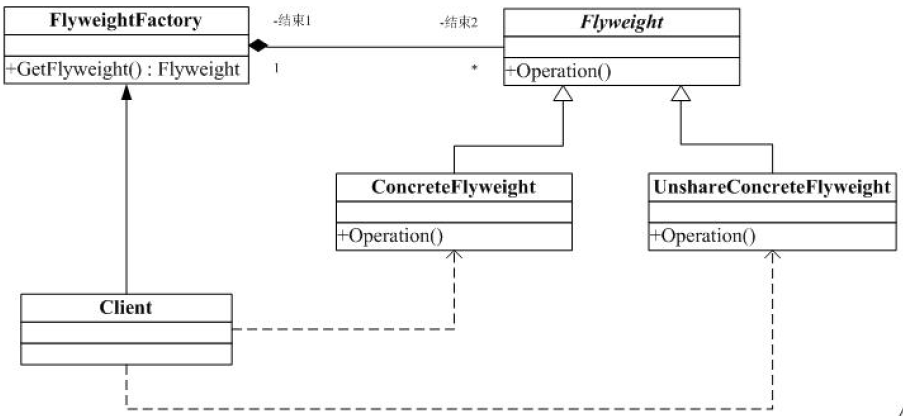1.Flyweight 模式以共享的方式高效的支持大量的细粒度对象,对象分为内部状态、外部状态。将可以被共享的状态作为内部状态存储在对象中,而外部状态在适当的时候作为参数传递给对象。
当以下所有的条件都满足时,可以考虑使用享元模式:
- 一个系统有大量的对象。
- 这些对象耗费大量的内存。
- 这些对象的状态中的大部分都可以外部化。
- 这些对象可以按照内蕴状态分成很多的组,当把外蕴对象从对象中剔除时,每一个组都可以仅用一个对象代替。
- 软件系统不依赖于这些对象的身份,换言之,这些对象可以是不可分辨的。
2.Flyweight模式结构图(不想被共享的对象UnshaerConcreteFlyweight,暂不讨论)

3.实现

1 #ifndef _FLYWEIGHT_H_ 2 #define _FLYWEIGHT_H_ 3 4 #include <string> 5 using namespace std; 6 7 class Flyweight 8 { 9 public: 10 virtual ~Flyweight(); 11 virtual void Operation(const string& extrinsicState); 12 string GetIntrinsicState(); 13 protected: 14 Flyweight(string intrinsicState); 15 private: 16 string _intrinsicState; 17 }; 18 19 class ConcreteFlyweight:public Flyweight 20 { 21 public: 22 ConcreteFlyweight(string intrinsicState); 23 ~ConcreteFlyweight(); 24 void Operation(const string& extrinsicState); 25 protected: 26 private: 27 }; 28 29 #endif

1 #include "Flyweight.h" 2 #include <iostream> 3 using namespace std; 4 5 Flyweight::Flyweight(string intrinsicState) 6 { 7 this->_intrinsicState = intrinsicState; 8 } 9 Flyweight::~Flyweight() 10 { 11 12 } 13 void Flyweight::Operation(const string& extrinsicState) 14 { 15 16 } 17 string Flyweight::GetIntrinsicState() 18 { 19 return this->_intrinsicState; 20 } 21 ConcreteFlyweight::ConcreteFlyweight(string intrinsicState):Flyweight(intrinsicState) 22 { 23 cout<<"ConcreteFlyweight Build....."<<intrinsicState<<endl; 24 } 25 ConcreteFlyweight::~ConcreteFlyweight() 26 { 27 28 } 29 void ConcreteFlyweight::Operation(const string& extrinsicState) 30 { 31 cout<<"ConcreteFlyweight:内蕴["<<this->GetIntrinsicState()<<"] 外蕴["<<extrinsicState<<"]"<<endl; 32 }

1 #ifndef _FLYWEIGHTFACTORY_H_ 2 #define _FLYWEIGHTFACTORY_H_ 3 4 #include "Flyweight.h" 5 #include <string> 6 #include <vector> 7 using namespace std; 8 9 class FlyweightFactory 10 { 11 public: 12 FlyweightFactory(); 13 ~FlyweightFactory(); 14 Flyweight* GetFlyweight(const string& key); 15 protected: 16 private: 17 vector<Flyweight*> _fly; 18 }; 19 20 #endif

1 #include "FlyweightFactory.h" 2 #include <iostream> 3 #include <string> 4 #include <cassert> 5 using namespace std; 6 using namespace std; 7 8 FlyweightFactory::FlyweightFactory() 9 { 10 11 } 12 FlyweightFactory::~FlyweightFactory() 13 { 14 15 } 16 Flyweight* FlyweightFactory::GetFlyweight(const string& key) 17 { 18 vector<Flyweight*>::iterator it = _fly.begin(); 19 for (; it != _fly.end();it++) 20 { //找到了,就一起用,^_^ 21 if ((*it)->GetIntrinsicState() == key) 22 { 23 cout<<"already created by users...."<<endl; 24 return *it; 25 } 26 } 27 Flyweight* fn = new ConcreteFlyweight(key); 28 _fly.push_back(fn); 29 return fn; 30 }

1 #include "Flyweight.h" 2 #include "FlyweightFactory.h" 3 #include <iostream> 4 using namespace std; 5 6 int main(int argc,char* argv[]) 7 { 8 FlyweightFactory* fc = new FlyweightFactory(); 9 Flyweight* fw1 = fc->GetFlyweight("hello"); 10 Flyweight* fw2 = fc->GetFlyweight("world!"); 11 Flyweight* fw3 = fc->GetFlyweight("hello"); 12 return 0; 13 }
